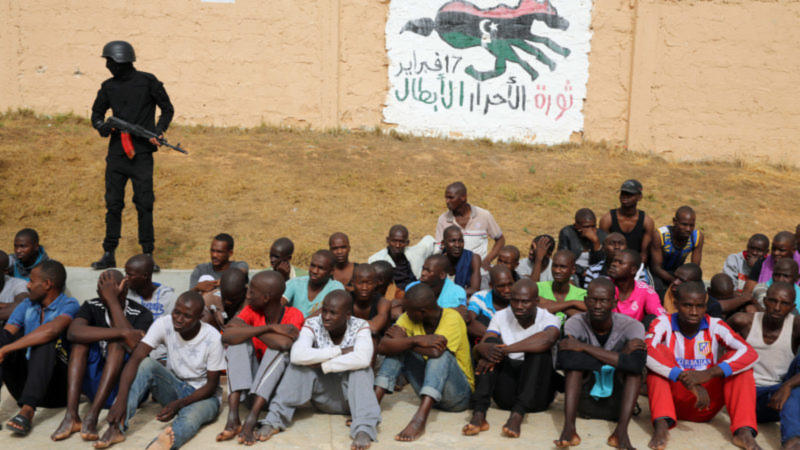
EurActiv (28 September 2017)
Italy, in a fresh bid to tackle a migration influx that has become a political headache, sketched proposals on Thursday (28 September) to resettle around the world a thousand vulnerable migrants who are stranded in Libya.
Foreign Minister Angelino Alfano pitched the idea before flying to Tripoli.
It would begin as a pilot scheme with “1,000 migrants” and entail “several countries around the world welcoming these people”, Alfano told a parliamentary committee in Rome.
The process would be “revolutionary,” as it would have to provide details about these individuals for host countries which are unable to interview them if they have closed their embassy in Tripoli, he said.
More than 600,000 people from Africa, Asia and the Middle East have arrived in Italy since 2014, many of them by sea from Libya. Rome is now looking hard at ways of discouraging migrants from crossing, including incentives for a voluntary return home or help for the most vulnerable.
A migrant quota scheme launched by the European Union wrapped up on Wednesday after two years. The programme has seen less than a fifth of a planned 160,000 Syrians and other asylum-seekers relocated around the block from Italy and Greece by the use of compulsory quotas.
Now the trend is to move from mandatory relocations to voluntary resettlement, which means taking candidates from outside the EU, on a non-mandatory basis. The scheme is being followed by a proposal to admit at least 50,000 of the “most vulnerable” persons in need of protection to Europe over the next two years.
The Commission’s new proposals envisage member states to set up “private sponsorship schemes” and pilot projects for legal migrations with third countries.
On Tuesday, Roberto Mignone, the representative for Libya with UN High Commissioner for Refugees (UNHCR), spoke of negotiations in Tripoli to open a 1,000-place transit centre for migrants considered vulnerable – families with children and the sick – with the aim of a resettling them to other countries.
But currently both UNHCR and other international agencies are waiting for a secure compound in Tripoli to bring in expatriate staff.
A contingent of 230 Nepalese troops is expected to arrive this week and deploy at the site, which would be ready in November, Mignone said.
No comments yet.
- EUROPE HAS STRONGEST THIRD QUARTER FOR SHARE LISTINGS SINCE 2014 Europe - EU 29.09.2017
- KAZAKHSTAN, BELARUS SEEK TRADE TURNOVER OF $1 BILLION BY 2020 Asia - Pacific 29.09.2017
- EXXONMOBIL, OMV PETROM TO DECIDE SOON ON BLACK SEA PROJECTS The Balkans 29.09.2017
- 3 MILLION USD WORTH EXPORT OF AMMUNITION FROM BiH TO PAKISTAN AGREED The Balkans 29.09.2017
-
 ITALY SKETCHES ‘REVOLUTIONARY’ IDEA TO RESETTLE 1,000 MIGRANTS STRANDED IN LIBYA
Europe - EU
29.09.2017
ITALY SKETCHES ‘REVOLUTIONARY’ IDEA TO RESETTLE 1,000 MIGRANTS STRANDED IN LIBYA
Europe - EU
29.09.2017
-
25.01.2016
THE ARMENIAN QUESTION - BASIC KNOWLEDGE AND DOCUMENTATION -
12.06.2024
THE TRUTH WILL OUT -
27.03.2023
RADİKAL ERMENİ UNSURLARCA GERÇEKLEŞTİRİLEN MEZALİMLER VE VANDALİZM -
17.03.2023
PATRIOTISM PERVERTED -
23.02.2023
MEN ARE LIKE THAT -
03.02.2023
BAKÜ-TİFLİS-CEYHAN BORU HATTININ YAŞANAN TARİHİ -
16.12.2022
INTERNATIONAL SCHOLARS ON THE EVENTS OF 1915 -
07.12.2022
FAKE PHOTOS AND THE ARMENIAN PROPAGANDA -
07.12.2022
ERMENİ PROPAGANDASI VE SAHTE RESİMLER -
01.01.2022
A Letter From Japan - Strategically Mum: The Silence of the Armenians -
01.01.2022
Japonya'dan Bir Mektup - Stratejik Suskunluk: Ermenilerin Sessizliği -
03.06.2020
Anastas Mikoyan: Confessions of an Armenian Bolshevik -
08.04.2020
Sovyet Sonrası Ukrayna’da Devlet, Toplum ve Siyaset - Değişen Dinamikler, Dönüşen Kimlikler -
12.06.2018
Ermeni Sorunuyla İlgili İngiliz Belgeleri (1912-1923) - British Documents on Armenian Question (1912-1923) -
02.12.2016
Turkish-Russian Academics: A Historical Study on the Caucasus -
01.07.2016
Gürcistan'daki Müslüman Topluluklar: Azınlık Hakları, Kimlik, Siyaset -
10.03.2016
Armenian Diaspora: Diaspora, State and the Imagination of the Republic of Armenia -
24.01.2016
ERMENİ SORUNU - TEMEL BİLGİ VE BELGELER (2. BASKI)
-
AVİM Conference Hall 24.01.2023
CONFERENCE TITLED “HUNGARY’S PERSPECTIVES ON THE TURKIC WORLD"









